According to sustainabletable.org, 10% of the energy used in the US is consumed by the food industry and, as Manning informs us, the number of calories of fuel per calories of food produced has grown exponentially over the last several decades. In fact, according to sustainabletable.org, beef production consumes 35 calories of fuel for every calorie of beef produced. This is clearly unsustainable. The seemingly miniscule amounts of diesel fuel it took to supply the products I consumed on Wednesday may not appear to be much, but multiplied by a factor of millions (i.e. the population of BC) a great amount of fuel is being used just to deliver the foodstuffs. This does not consider how much fuel it takes to make the trucks and trailers that bring the food. It also does not consider the fact that the vegetables and fruit must be picked early (unripe) and ripen in the truck, thus presenting a quality problem, and perhaps even a foodborne disease problem.
Wednesday Dinner
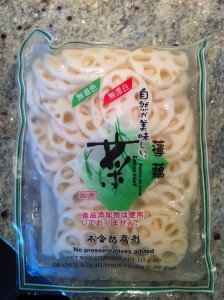 Wednesday Dinner — The dinner meal consisted of lotus root, canned corn, frozen peas, black fungus and pork ribs. The lotus root was imported from China by Watson Enterprises Inc. (URL currently under reconstruction), but the actual cost of shipping the lotus root from the farm in China to the port and then across the Pacific Ocean to Canada, and then to the distributor is nearly
Wednesday Dinner — The dinner meal consisted of lotus root, canned corn, frozen peas, black fungus and pork ribs. The lotus root was imported from China by Watson Enterprises Inc. (URL currently under reconstruction), but the actual cost of shipping the lotus root from the farm in China to the port and then across the Pacific Ocean to Canada, and then to the distributor is nearly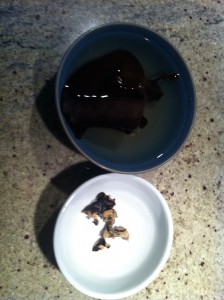 impossible to ascertain. The canned corn and frozen peas were both Green Giant products (www.greengiant.com). An email to them Monday has remained unanswered, so I cannot say where the two vegetables originated from, except to say that the San Joaquin Valley in CA grows over 90% of the vegetables consumed in the US
impossible to ascertain. The canned corn and frozen peas were both Green Giant products (www.greengiant.com). An email to them Monday has remained unanswered, so I cannot say where the two vegetables originated from, except to say that the San Joaquin Valley in CA grows over 90% of the vegetables consumed in the US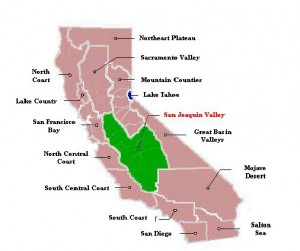 (www.sustainabletable.org/issues/energy). I assume the vegetables came from there, and the cost would be roughly the same as transporting the prunes to Vancouver. The black fungus originated in Taiwan, where I come from. Once again, shipping details would be next to impossible to ascertain, except to say that the fungus would have arrived by container, but it is difficult to say whether that container would have arrived in Vancouver, Seattle or even LA. The brand is Six Fortunes (www.sixfortune.ca). The pork ribs came from a farm in the Paradise Valley region of Alberta. The pigs were trucked to Vancouver and slaughtered and packaged by Donald’s Fine Foods (www.donaldsfinefoods.com). The distance between Paradise Valley and Richmond, BC is 1,421 km. The same calculation would apply to the cost of shipping the pigs, except that live animals are given more room than produce or other foodstuffs, and the cost of fuel would be greater because all the transportation would be through Canada, which has higher diesel fuel costs.
(www.sustainabletable.org/issues/energy). I assume the vegetables came from there, and the cost would be roughly the same as transporting the prunes to Vancouver. The black fungus originated in Taiwan, where I come from. Once again, shipping details would be next to impossible to ascertain, except to say that the fungus would have arrived by container, but it is difficult to say whether that container would have arrived in Vancouver, Seattle or even LA. The brand is Six Fortunes (www.sixfortune.ca). The pork ribs came from a farm in the Paradise Valley region of Alberta. The pigs were trucked to Vancouver and slaughtered and packaged by Donald’s Fine Foods (www.donaldsfinefoods.com). The distance between Paradise Valley and Richmond, BC is 1,421 km. The same calculation would apply to the cost of shipping the pigs, except that live animals are given more room than produce or other foodstuffs, and the cost of fuel would be greater because all the transportation would be through Canada, which has higher diesel fuel costs.
Wednesday Lunch
Wedne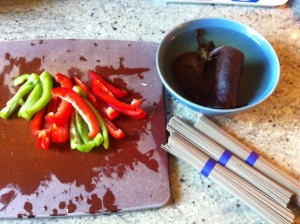 sday afternoon – There were several foodstuffs in my lunch: soba noodles, onions and green and red peppers. Soba noodles, which is really Japanese vermicelli, is made in Korea (www.wangfood.com) of wheat flour, buckwheat, salt and water. The soba noodles are shipped from Korea by container to Canada. There are approximately 1000 containers on a ship. Each ship carries a mixture of 20 ft. (1900 kg.) and 40 ft. (3800 kg.) containers. The 40 ft. containers are standard and they can carry 26,000 kg. of product. Shipping costs for these containers are $2,000 – $3,000, brokerage fees $500, customs fees $1,500, and delivery fees $400 (www.seavilletransport.com). It takes approximately 17 days for the noodles to arrive in Canada. Fuel costs and other shipping costs were unavailable at the time of blogging. The onions were trucked from the Columbia Basin in WA to the Costco Distribution Centre in Langley, BC, a distance about 483 km. A standard reefer trailer is 45 ft. long and holds a payload of 21,772 kg. of product. The tractor unit that pulls the trailer has a diesel engine that gets approx. 0.4 km per litre of fuel (www.gotcanada.ca). A trip of 483 km at 0.4 km per litre would use 193 litres of fuel, which is roughly 1/3 of a tank of fuel (a full tank being approx. 605 litres). If we divide the 193 litres of fuel by the 21,772 kg of product it took approx. 0.009 litres of fuel to deliver a kg of goods to Vancouver from the Columbia Basin in WA. The individual weight of my portion of onions was far less than 1 kg, perhaps closer to 50 grams, so the cost to get that portion to Langley would be 0.009/20 or 0.00045 litres of fuel. A separate truck would distribute the onions to the individual T&T stores, but I was unable to ascertain the type of truck, its fuel consumption and its route.
sday afternoon – There were several foodstuffs in my lunch: soba noodles, onions and green and red peppers. Soba noodles, which is really Japanese vermicelli, is made in Korea (www.wangfood.com) of wheat flour, buckwheat, salt and water. The soba noodles are shipped from Korea by container to Canada. There are approximately 1000 containers on a ship. Each ship carries a mixture of 20 ft. (1900 kg.) and 40 ft. (3800 kg.) containers. The 40 ft. containers are standard and they can carry 26,000 kg. of product. Shipping costs for these containers are $2,000 – $3,000, brokerage fees $500, customs fees $1,500, and delivery fees $400 (www.seavilletransport.com). It takes approximately 17 days for the noodles to arrive in Canada. Fuel costs and other shipping costs were unavailable at the time of blogging. The onions were trucked from the Columbia Basin in WA to the Costco Distribution Centre in Langley, BC, a distance about 483 km. A standard reefer trailer is 45 ft. long and holds a payload of 21,772 kg. of product. The tractor unit that pulls the trailer has a diesel engine that gets approx. 0.4 km per litre of fuel (www.gotcanada.ca). A trip of 483 km at 0.4 km per litre would use 193 litres of fuel, which is roughly 1/3 of a tank of fuel (a full tank being approx. 605 litres). If we divide the 193 litres of fuel by the 21,772 kg of product it took approx. 0.009 litres of fuel to deliver a kg of goods to Vancouver from the Columbia Basin in WA. The individual weight of my portion of onions was far less than 1 kg, perhaps closer to 50 grams, so the cost to get that portion to Langley would be 0.009/20 or 0.00045 litres of fuel. A separate truck would distribute the onions to the individual T&T stores, but I was unable to ascertain the type of truck, its fuel consumption and its route.
The green and red peppers came from Prime Time, a produce conglomerate located in the Coachella Valley, CA. The peppers came to Vancouver by truck over a distance of about 1800 km. Assuming that the transport was a standard diesel, and plugging in the extra km, the shipping costs would be approx. 720 litres of fuel. Assuming that my portion of green and red peppers on Wednesday was approx. 100 grams, the cost of getting the peppers to Vancouver was 772/21,720= 0.033 litres of fuel to deliver a kg of goods to Vancouver from the Coachella Valley, CA. My portion that afternoon was approx. 100 grams of peppers, thus costing a miniscule amount of fuel.
Tea time (afternoon) – I drank TrueBlue blueberry juice, which is made in Alberta, but the blueberries are picked on the east coast of Canada from wild patches and trucked to Alberta, where they are juiced and containerized, then shipped to all parts of Canada. The distance the blueberries came is approx. 5000 km (from New Brunswick to Alberta), and the finished product was shipped another 1000 km, where it was distributed by local trucks throughout the Lower Mainland. The costs are similar to the costs listed above except that diesel fuel is cheaper in the US. ($1.21 per litre in Canada; $0.90 per litre in the US). The prunes I ate were grown on the Taylor Brothers Farm outside of Fresno, CA (approx. 1355 km from Vancouver). The same equation applies to the cost of fuel with a slight variation in distanced traveled. 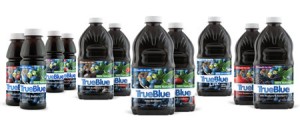
Wednesday Morning
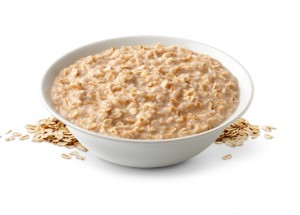 Wednesday morning — I consumed two products: oatmeal, which consists of oats and oat bran and soymilk. I contacted Quaker Canada (a division of Pepsico Canada) to determine where the product is made and how it gets to Vancouver. They responded with a nice email, essentially saying that they get hundreds of requests daily for information and they cannot respond to every request (see email response on bottom of post). The only other item I consumed for breakfast is soymilk. The company that makes it, Sunrise, is local (729 Powell St. Vancouver) and I assume the ingredients are locally produced. The company spokeswoman did not say where the ingredients come from.
Wednesday morning — I consumed two products: oatmeal, which consists of oats and oat bran and soymilk. I contacted Quaker Canada (a division of Pepsico Canada) to determine where the product is made and how it gets to Vancouver. They responded with a nice email, essentially saying that they get hundreds of requests daily for information and they cannot respond to every request (see email response on bottom of post). The only other item I consumed for breakfast is soymilk. The company that makes it, Sunrise, is local (729 Powell St. Vancouver) and I assume the ingredients are locally produced. The company spokeswoman did not say where the ingredients come from.

Yali:
Thanks for choosing Quaker Instant Oatmeal for your assignment. As much as we’d like to provide the information you requested, please understand that time does not permit us to research and prepare special answers for the numerous requests we receive each day.
If it helps, you may find some of the information your seeking on our corporate website and viewing the information we have on environmental sustainability. To do so, just click on this link:
http://www.pepsico.ca/en/
Hello world!
Welcome to UBC Blogs. This is your first post. Edit or delete it, then start blogging!